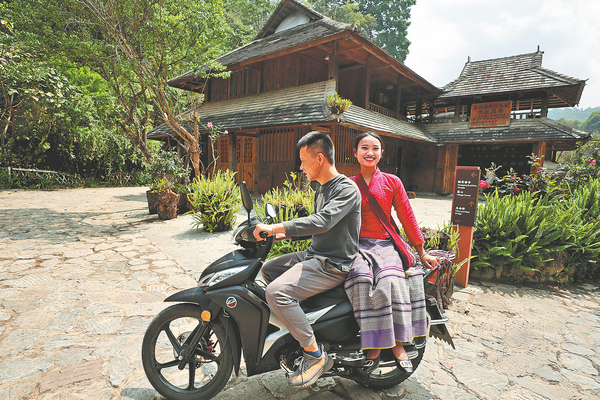Perfect taste of tradition, brewed in a stream


In a forest on Jingmai Mountain in Lancang county, Yunnan province, Xian Jin, 22, tasted tea under a tea tree more than 100 years old in late March, the ripest of times for picking tea.
In front of her was a smartphone through whose screen viewers were deluging her with questions about the taste of the tea and the local tea culture.
Xian interacts with the viewers through a livestreaming platform that demonstrates how tea picking is done, and now and again they enjoy a bonus: Xian singing and dancing to the melody of local music. In March and April it is common for her to work until about 10 pm as villagers process freshly picked leaves.
Xian is a member of the Dai ethnic group in the village of Nuogang on Jingmai Mountain, where one of the world's oldest and largest cultivated tea forests is located. For more than 1,000 years the village has lived off the ancient tea plantations.
"When I was 3, my mother carried me with a basket on the back to the tea plantation, and I helped her pick tea leaves," Xian says.
Making and drinking tea is integral to the lives of all villagers, young and old, she says.
However, what makes Xian stand out is that she is the first of the Dai villagers to sell tea online and to promote the local tea culture through that channel, mainly by way of Douyin, a popular video-sharing platform.
She often starts streaming at 3 pm or 4 pm, she says, continuing until late into the night at the busiest times of the year, in spring and autumn when tea is harvested and processed.
At other times Xian presents to viewers the picturesque landscape of the village and its surrounds and gives them insights into the villagers and their culture. Some of her viewers come from across the globe, including Italy and nations of Southeast Asia.
The very rudimentary transport routes giving access from the outside world to Jingmai Mountain, and vice versa, mean that few of those who live there ever venture beyond its confines. Indeed Xian is one of the few young people in the village who has stepped foot in big cities, including Kunming, capital of Yunnan, and Shenzhen, Guangdong province, where Xian learned a lot of what she knows about Chinese tea culture, the art of tea making and tea tasting.
Last year when she began livestreaming with her boyfriend Ding Zhixiong, 28, they spent a day, smartphone in hand, touring the village and the tea plantations to give internet audiences a glimpse of villagers producing tea.
"Villagers didn't get what we were up to," Xian says. "I guess they thought we were just idling about."
When they cottoned on to what Xian and his boyfriend were doing, they gave the couple's online venture a giant thumbs-up, aware that the area's tea traditions were being made known to a wide audience. Once the venture became well known to young people who had left the village to study or to make the most of better work opportunities, many returned to the village and began setting up their own livestreaming channels.
Ai Sailuan, leader of the Dai ethnic group in the area, says Xian has set a good example on spreading tea culture and has thus given a fillip to the tea industry there. Previously tea sales had been restricted to people visiting the area, he says.
"Older people like me have little idea of the internet and social media. Young people like Xian are helping us make our tea available to a much larger group of buyers. That also means that many young people are opting to live in the village rather than moving to cities to make a living."
Xian stresses that her business was by no means an instant success. When what she showed online was almost exclusively related to tea, she had fewer than 100 viewers for a time, but several months after she began diversifying what she was presenting, such as showing scenic tea plantations and the attractive ancient village, the number of viewers shot up into the tens of thousands, she says.
"I was proud and excited to see that so many people from across the world love our tea and village."
Xian demonstrates all aspects of tea production, such as climbing onto tea trees to pick leaves and tossing and drying leaves in pots. The colorful traditional Dai clothing and accessories she wears add to the spectacle.
"Audiences are often keen to know about what I'm wearing, and that gives me an opportunity to talk about our culture," Xian says.
Ding says that livestreaming in the tea tree forest at night presents some risks.
"We come across various types of snakes, and Xian once stumbled on a poisonous one."
Xian says the livestreaming is bringing in about 8,000 yuan ($1,160) in tea sales a day. Ai, the village leader, says the average yearly income of a villager is less than 20,000 yuan.




































